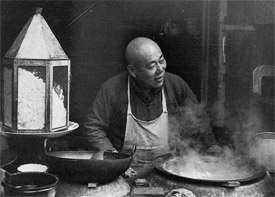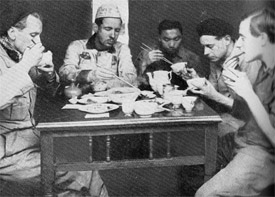The apparent cheapness with which human life was valued in wartime China was shocking for many, as was the extreme contrast between the privileged few and the poverty of most. In this context the value of worldly goods was largely reduced to their practical utility. Personal possessions frequently seemed to disappear in the night, and the Convoy learnt to sleep in their trucks when en route or, when trucks could be safely stowed, to sleep on tables to enable their boots to be inserted under the table legs and thus secured.
Even for many Chinese, the provinces of Western China were considered to be the backwoods: many people went barefoot and foot-binding for women was still in evidence. The main beasts of burden were human. Many cities still had their medieval city walls inside which were labyrinths of narrow streets and alleyways.
But it was all beautiful with landscapes dominated by vast skies and soaring mountains rising above the plains. Many memoires describe the variety of the birds and the splendour of the birdsong, the extraordinary size and colours of the butterflies and the abundance of wild flowers.
Although it was remote and alien there was a well established western presence throughout the area. A number of China Inland Missions had been operating for many years supported by various Christian denominations. There was a thin but effective network of Quakers and Chungking had had a Quaker school and Centre since the 1890s. This meant that Convoy members frequently found familiar western comforts in even the remotest spots, and many memoirs are full of accounts of hot baths, proper bed linen, afternoon teas, religious services, gramophones and even concerts.
The Unit was widely dispersed across a vast area but periodic get-togethers were held, often concluding with much singing led by the Welsh contingent. The Convoy also produced a newsletter containing stories and other reflections and a considerable number of frequently scurrilous songs and poems. When possible, Sundays were preserved as a day of rest, with many meeting for worship, going sight-seeing or bathing and holding football matches.
Some of them even found time to get married, including Ron Condick and Connie Bull who were married by Ronald Owen Hall, Bishop of Hong Kong and South China who had fled HK on an oxcart.
The biggest gripes of Convoy members seem to have been the limited selection of gramophone records to which they had access and the ubiquitous bed-bugs which they encountered. One thing they rarely complained about was the food although they developed individual preferences between the rice and noodles of the south and the dough-cakes, pancakes and hot pepper of Szechwan. Many fondly recalled how front rooms or porches of roadside dwellings were almost instantly transformed into Fan Diens or eating houses, and how rapidly rice and soup and noodles and tea would appear augmented with fast cooked vegetables and whatever else was to hand.



 FAU China Convoy Reunion Group
FAU China Convoy Reunion Group